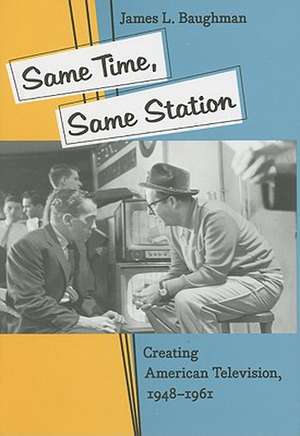Same Time, Same Station – Creating American Television 1948–1961
Autor James L Baughmanen Limba Engleză Hardback – 16 apr 2007
In Same Time, Same Station, historian James L. Baughman takes readers behind the scenes of early broadcasting, examining corporate machinations that determined the future of television. Split into two camps--those who thought TV could meet and possibly raise the expectations of wealthier, better-educated post-war consumers and those who believed success meant mimicking the products of movie houses and radio--decision makers fought a battle of ideas that peaked in the 1950s, just as TV became a central facet of daily life for most Americans.
Baughman's engagingly written account of the brief but contentious debate shows how the inner workings and outward actions of the major networks, advertisers, producers, writers, and entertainers ultimately made TV the primary forum for entertainment and information. The tale of television's founding years reveals a series of decisions that favored commercial success over cultural aspiration.
Preț: 325.20 lei
Nou
Puncte Express: 488
Preț estimativ în valută:
62.25€ • 67.64$ • 52.32£
62.25€ • 67.64$ • 52.32£
Carte tipărită la comandă
Livrare economică 21 aprilie-05 mai
Preluare comenzi: 021 569.72.76
Specificații
ISBN-13: 9780801879333
ISBN-10: 0801879337
Pagini: 448
Dimensiuni: 177 x 233 x 37 mm
Greutate: 0.77 kg
Editura: Johns Hopkins University Press
Locul publicării:Baltimore, United States
ISBN-10: 0801879337
Pagini: 448
Dimensiuni: 177 x 233 x 37 mm
Greutate: 0.77 kg
Editura: Johns Hopkins University Press
Locul publicării:Baltimore, United States
Notă biografică
James L. Baughman is professor and director of the School of Journalism and Mass Communication at the University of Wisconsin-Madison and author of The Republic of Mass Culture: Journalism, Filmmaking, and Broadcasting in America since 1941 and Henry R. Luce and the Rise of the American News Media, both published by the Johns Hopkins University Press.
Descriere
The tale of television's founding years reveals a series of decisions that favored commercial success over cultural aspiration.















